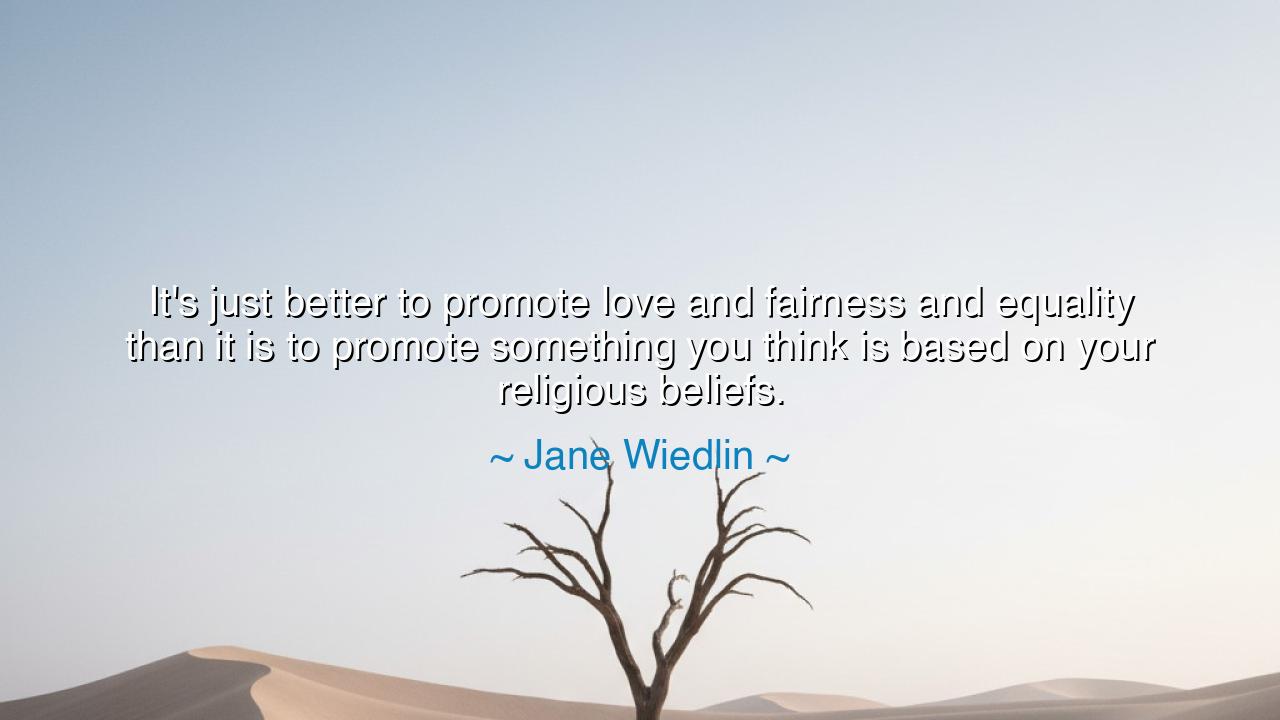
It's just better to promote love and fairness and equality than
It's just better to promote love and fairness and equality than it is to promote something you think is based on your religious beliefs.






The voice of Jane Wiedlin, artist and seeker of truth, speaks with clarity in the words: “It’s just better to promote love and fairness and equality than it is to promote something you think is based on your religious beliefs.” Here, in simple form, she proclaims a principle as old as the prophets, yet ever renewed: that the highest law is love, and the noblest creed is fairness. While men have long divided themselves over doctrines, interpretations, and sacred texts, Wiedlin reminds us that love unites where dogma divides, and that the true fruit of the spirit is found in equality and compassion, not in rigid proclamations.
From the earliest days of human civilization, religion has been both a torch and a chain. It has illuminated the path of morality, but it has also bound humanity in wars, inquisitions, and intolerance. The ancients themselves wrestled with this paradox. The Hebrew prophets thundered not for ritual but for justice: “Let justice roll down like waters, and righteousness like a mighty stream.” Even they knew that the divine is not honored by sacrifice alone, but by fairness and care for the oppressed. Wiedlin’s words echo this timeless truth: when religious belief leads to division, it betrays the very heart it claims to honor; but when love and equality are raised above all, then true holiness is found.
History offers us luminous examples. Consider the life of Martin Luther King Jr., a man deeply rooted in faith, yet who understood that faith must express itself in justice rather than exclusion. Though his voice rang with the cadences of scripture, his mission was not to impose doctrine but to awaken conscience. He did not march for one creed against another; he marched for the dignity of every soul, declaring that love and fairness are higher than prejudice disguised as piety. In his life we see Wiedlin’s wisdom embodied: religious belief becomes powerful only when it bows before the greater law of equality.
Too often, men have used religion as a sword. The Crusades, the Inquisition, the countless sectarian wars—each claimed the banner of heaven, yet each spilled blood in the name of God. In these tragedies we see the folly of promoting “what you think” your religion demands, rather than promoting love and fairness. For doctrines are many, but compassion is one; interpretations shift, but the command to love endures. Wiedlin reminds us that peace will not be found in dogmatic triumph, but in the humble act of treating every soul with respect and equality.
This teaching is not a rejection of faith, but its fulfillment. For every faith, in its purest essence, calls its children to love. But when belief is hardened into a weapon, it loses its spirit. To promote love is to honor the divine more fully than any creed can express. To stand for equality is to live out the truest form of righteousness. To practice fairness is to prove that the sacred is not an idea to be argued, but a way to be lived.
So, the lesson for us is this: let your guiding principle be compassion, not contention. If your faith leads you to care for the widow, the orphan, the stranger—then it is true. If it leads you to condemn, divide, or exalt yourself above others—then it has strayed. Better to err in love than to be flawless in doctrine. Better to practice fairness than to enforce ritual. For in the end, the heart of all wisdom is not in what creed you recite, but in how you treat those who stand before you.
Practical wisdom flows from this truth: in your homes, treat one another with kindness before argument. In your communities, defend those who are silenced or shunned. In your hearts, measure your actions not by whether they conform to tradition, but by whether they bear the fruits of love, fairness, and equality. If you must promote anything, let it not be the cold stone of dogma, but the living flame of compassion.
Thus, let Jane Wiedlin’s words be carried as a lamp into the future: that the greatest testament of our lives will not be what we believed, but how we loved. For when the doctrines of men are forgotten, the deeds of love will remain, shining like stars in the eternal night.






AAdministratorAdministrator
Welcome, honored guests. Please leave a comment, we will respond soon